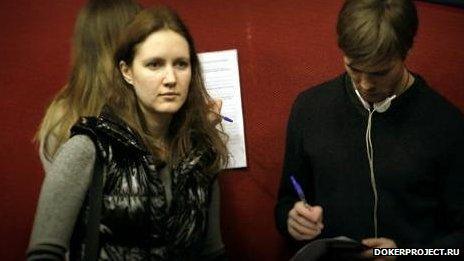A tale of two Russians
- Published

Yulia Kiseleva and Grigory Rudko before Grigory left Russia
More than 2.5 million people have left Russia during the past decade, sparking fears of a new brain-drain.
A third of Russia's young professionals are thinking of leaving the country, according to the Russian market research company ROMIR.
Many of them are making plans to go to countries whose economy is performing less well than Russia's. So why do they want to leave?
Dreaming of escape
Grigory Rudko is one of those who was dreaming of leaving and now he has taken the plunge.
A graduate of Russia's prestigious Gerasimov Institute of Cinematography, where Sergey Eisenstein once taught, Grigory has moved to San Francisco to launch his own business, an online archive resource called Photo Time Machine.
Grigory says it is easier and more profitable to start a business in the US, where he doesn't have to deal with as much bureaucracy and the political issues that irritated him in Russia.
"I wish I could distance myself from what's going on in the country but it proved to be impossible for me," he says. "I was very stressed in Russia. When you have to keep these negative feelings permanently, it's self-destructive, it leads you nowhere, gives you nothing."
In Russia Grigory worked as a cameraman for several TV stations and has several documentaries under his belt.
"I travelled to different parts of Russia, filmed in North Caucasus, but most of what I've witnessed and filmed couldn't be broadcast on state TV channels, I had to offer it to the foreign media."
"At one point I was just tired of seeing one picture in real life and totally different images on national TV channels".
Staying strong
Not all of Grigory's friends share his opinion. Yulia Kiseleva was his classmate at the film school in Moscow.
She stayed in Russia directing and editing documentaries. Her last film, Arms Wide Open, about the work of young Russian volunteers helping out old people abandoned by their children won numerous festival awards.
Yulia says: "I can fulfil myself here. In my documentaries, I try not to stress how awful things are in Russia.
"In many cases they are. Every social issue is a tragedy. But I try to show there is a way forward and I choose main characters that change things for better.
"Someone can complain about how terrible life is and someone else goes and improves things."
The only thing that sometimes makes her feel frustrated is that as a young mother and a professional, she can't afford to buy her own apartment. But she knows that her peers elsewhere in Europe or in America face similar problems.
Yulia is convinced that wherever you live, you will always find something to complain about.
"I'm sure that were I to live in the US, I would have grumbled about its medical care or expensive child care," she says.
"Here in Moscow, my child goes to nursery for free and I am absolutely satisfied with that.
"I don't see though why it has to be a big deal - today you live in one country, tomorrow you move to the other and in the future you might come back".
A generation divided
While young urban Russians have itchy feet, most of the older generation and those who live in rural Russia don't even have a foreign passport.
In its research, the Levada Centre, a Russian independent, non-governmental polling organisation, found that 78% of respondents had never travelled outside the country.
The divide isn't just generational, it's also political.
On the eve of March's presidential elections VTSIOM, a leading state respondents, found that 93% of those who supported Vladimir Putin did not want to leave Russia.
Some commentators believe the political class are happy with the situation. Lidiya Andrusenko, from New Politics magazine, says: "Young dissenters leave the country while supporters of the regime stay behind. Isn't it comfortable?"
Others say the problem is one that needs to be taken seriously.
"Russia might lose the most educated, advanced and critically thinking strata of a society", warns Natalya Zorkaya, from the Levada Centre.
"These are people who could be a driving force behind the country's modernisation, but a current political climate makes them feel estranged".